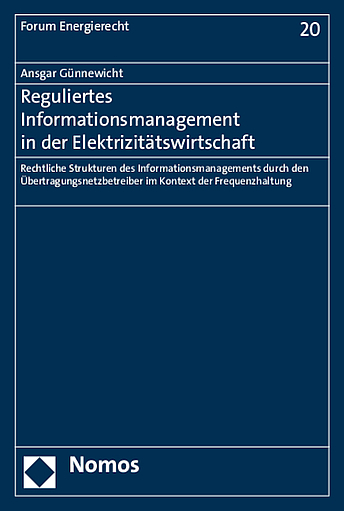englischManagement of information within the electricity industry naturally bears a substantial complexity which has been further increased by liberalisation of the energy industry and the turnaround in energy policy. To this extent not only does the electricity industry have to face information-related challenges. Rather it is the ultimately responsibility of the state to guarantee practical management of this information and thereby maintain a functional electricity supply.
This doctoral thesis investigates the quality of law-making at the interface between energy and information law. Using the important example of frequency control it determines that not only do the existing legal structures show a substantial potential for optimization but, based on general analytical tools, develops specific proposals to improve the present legal framework.
Das Informationsmanagement in der Elektrizitätswirtschaft weist naturgemäß eine beträchtliche Komplexität auf, welche infolge der Liberalisierung und Energiewende allerdings noch potenziert wurde. Informationsbezogenen Herausforderungen sieht sich dabei nicht nur die Elektrizitätswirtschaft selbst gegenüber. In letzter Verantwortung ist vielmehr der Staat gefordert, ein anforderungsgerechtes Informationsmanagement und damit letztlich eine funktionstüchtige Elektrizitätsversorgung zu gewährleisten.
Die Untersuchung beschäftigt sich mit der Qualität staatlicher Rechtsetzung an dieser Schnittstelle von Energie- und Informationsrecht. Am Beispiel des sensiblen Bereichs der Frequenzhaltung zeigt sie nicht nur auf, dass die bestehenden rechtlichen Strukturen ein beträchtliches Optimierungspotential aufweisen. Daran anknüpfend werden auf der Grundlage eines abstrahierten Analyseinstrumentariums konkrete Vorschläge formuliert, um den bestehenden Rechtsrahmen zu verbessern.


